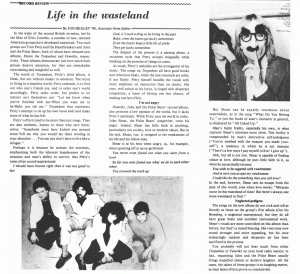Record Review: Life in the wasteland
By Jon Healey
The Daily Princetonian - November 16, 1979
In the wake of the second British invasion, led by the likes of Elvis Costello, a number of new, talented American groups have developed unnoticed. Two such groups are Tom Petty and the Heartbreakers and Jules and the Polar Bears, both of whom have released new albums, Damn the Torpedoes and Fenetiks, respectively. These albums demonstrate just how much both groups deserve attention, for they are remarkably entertaining and insightful as well.
The world of Torpedoes, Petty's third album, is bleak, but not without means to salvation. The secret to living in a hopeless world, Petty contends, is to find out who ones' friends are, and to order ones' world accordingly. Petty seeks order, but prefers to let matters sort themselves out: "Let me know when you're finished with me/What you want me to be/Baby you tell me." Torpedoes thus represents Petty's attempt to tie up his loose ends and make sense of what he has left.
Petty's efforts tend to be more than just songs. They are also anthems, hymns to those who save themselves: "Somebody must have kicked you around some/Tell me why you would lay there reveling in your abandon ... You see you don't have to live like a refugee."
Perhaps it is because he stresses the extremes, emphasizing both the inherent hopelessness of the situation and man's ability to survive, that Petty's tunes often sound inspirational:
I should have known right then it was too good to last
God, it's such a drag to be living in the past
Baby, even the losers get lucky sometimes
Even the losers keep a little bit of pride
They get lucky sometimes
The despair of the present is a passing phase, a recurrent cycle that Petty accepts resignedly while banking on the promise of things to come.
As usual, Petty's melodies are the strongpoint of his music. The songs on Torpedoes all have good hooks and infectious beats, while the instrumentals are solid, if not flashy. Petty himself handles the vocals with more emphasis on expression than on clarity. His tone, well suited to the lyrics, is tinged with desperate resignation, a sense of having one last chance, of making one last effort.
I'm not angry
Fenetiks, Jules and the Polar Bears' second album, also presents low opinion of the world, but it lacks Petty's optimism. While Petty puts his world in order, Jules Shear, the Polar Bears' songwriter, vents his anger. Indeed, Shear has little faith in anything, particularly not society, love, or modern values. But in the end, Shear, too, is resigned to the weaknesses of his life and his fellow man.
Shear is at his best when angry, as, for example, when spouting off at an ex-girlfriend:
You never even found out what you want from a lover
So far you only found out what we do to each other when
You screwed the truth up
But Shear can be equally venomous about materialism, as in the song "What Do You Belong To," or just the faults of man's character in general, as displayed in "All Caked Up."
Man's futile frality, especially his own, is what captures Shear's attention most often. This futility is compounded by man's destructive self-indulgence ("You're stabbed with the weapon you made yourself"), a tendency to which he is not immune ("There's a few ways I pay myself to live/I give up").
Ahh, but all is not lost: Shears is capable of finding solace in love, although he puts little faith in it, as when he sarcastically intones:
You wish to be sugared with sweetnesses
And in turn you accept my weaknesses
Could this be the something that you call love?
In the end, however, Shears sees no escape from the pain of this world, even when love works: "Miracles occur in this wasteland of time/But there's always one more wasteland to find."
Neglected pedigree
The songs on the new album do not rock and roll as fiercely as those on the group's first album (Got No Breeding, a neglected masterpiece), but they do all have great beats and excellent instrumental work. Shear's vocals are more controlled on this album than before, but that's a mixed blessing. His voice may now sound stronger and more appealing, but his once endearingly random and desperate air has been sacrificed in the process.
You probably will not hear much from either Torpedoes or Fenetiks on your local radio station; in fact, requesting Jules and the Polar Bears usually brings stupefied silence or derisive laughter. All the same, the talent of those groups is no laughing matter, as their latest efforts prove so conclusively.

